UNDERGRADUATE RESEARCH BLOGS
The Office of Undergraduate Research sponsors a number of grant programs, including the Circumnavigator Club Foundation’s Around-the-World Study Grant and the Undergraduate Research Grant. Some of the students on these grants end up traveling and having a variety of amazing experiences. We wanted to give some of them the opportunity to share these experiences with the broader public. It is our hope that this opportunity to blog will deepen the experiences for these students by giving them a forum for reflection; we also hope these blogs can help open the eyes of others to those reflections/experiences as well. Through these blogs, perhaps we all can enjoy the ride as much as they will.
EXPLORE THE BLOGS
- Linguistic Sketchbook
- Birth Control Bans to Contraceptive Care
- A Global Song: Chris LaMountain’s Circumnavigator’s Blog
- Alex Robins’ 2006 Circumnavigator’s Blog
- American Sexual Assault in a Global Context
- Beyond Pro-GMO and Anti-GMO
- Chris Ahern’s 2007 Circumnavigator’s Blog
- Digital Citizen
- From Local Farms to Urban Tables
- Harris Sockel’s Circumnavigator’s Blog 2008
- Kimani Isaac: Adventures Abroad and At Home
- Sarah Rose Graber’s 2004 Circumnavigator’s Blog
- The El Sistema Expedition
- The World is a Book: A Page in Rwand
Madeline
Madeline
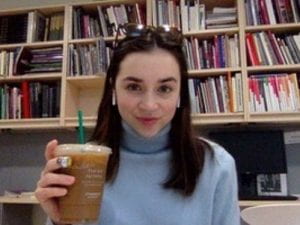
Madeline was featured on the Block Museum’s website for her role as a research assistant there! Here’s what Madeline had to say about her experience: “I’ve always loved visiting all types of museums, so my first year at university I took a few art history classes which I really enjoyed. While my major is now anthropology, I applied to the Curatorial Internship at the Block Museum the summer after my sophomore year. That internship introduced me to the museum world and showed me what goes on behind the scenes, especially on the curatorial side. When that internship ended, I was invited to apply for a Research Grant to continue working on various projects at the Block. I am so grateful for these opportunities, as each project is different and thus I constantly learn more skills, like writing reports on works in the collection, aiding on research for future exhibitions, and working in the online database, that will help me become qualified for a museum career one day!”
Joe
Joe
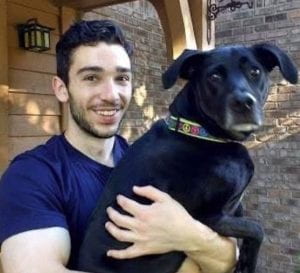
“As a junior at Northwestern, I knew I wanted to get involved in research within the computer science department but wasn’t quite sure how to start. OUR and the supportive faculty at Northwestern fostered that interest, and now I’m able to explore new ideas and build cool things everyday as my full-time job. Everything I learned, from writing a publishable paper and petitioning for grant money, to refining research ideas and how to investigate them, is invaluable to the work I do. I even met my current employer through a conference OUR helped me prepare for and attend.”
Alex
Alex
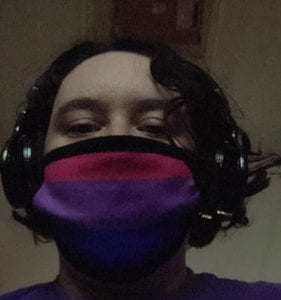
Alex started her journey with research using a Weinberg Summer Grant, which she took with her to a clinical pharmacology department at Cincinnati Children’s Hospital. This led her to start at a new lab at Feinberg– bridging their interests in pharmacology with her interest in neuroscience. Alex spent her junior and senior years at Northwestern, during which she was awarded a Summer URG, working with this lab, and continued after they graduated in 2018.
For Alex, this time taught them what direction she wanted to approach science from. She said, “There was a lot of observation of myself and what path I wanted to follow…and how that fits into the greater scheme of…current neuroscience research either in that lab or elsewhere…It was a lot also, of figuring out what I wanted from a mentor and how I wanted those relationships to develop.” Alex also highlighted the importance of mentorship, especially as a first-generation low income student, in starting to think about graduate school and what that could look like. She stated how important it was to have “someone who understands what I’m saying and then can translate it into…the right terms…especially because no one in my family knew how to do that. [During undergrad] I was able to forge connections that I still have, like, I email [OUR staff] updates, I still talk to my first ever PI about like, how life is going.”
Alex also gave some advice when it comes to grad school and adopting a pet– recommending “the biggest thing about that, you gotta get the pet a year beforehand or once things start settling down after comps” to establish that bond and trust. She adopted her cat, Ki, the year she graduated!
Chris
Chris
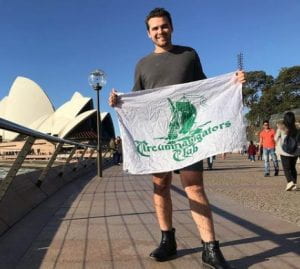
Chris was our Circumnavigator winner in 2019! Check out what he said about the opportunity and how it continued to impact him, even now after the trip has long been over!
“After my four years at NU, I can say with confidence that the Circumnavigator’s grant is among the best opportunities offered to Northwestern undergraduates. In summer 2019, I was fortunate enough to be selected for this grant which supported me on a worldwide tour to research the sacred musical cultures of Baha’i Temples. Over the 10 weeks and 6 countries, I gained a richer understanding of each destination through its music and a broader appreciation for our beautifully diverse world. I am excited to continue my research, my circumnavigation upon my return to New Delhi, India where I will pursue a Fulbright Fellowship on the same project. Best of luck to all applicants… the world awaits you!”
Debbie-Marie
Debbie-Marie
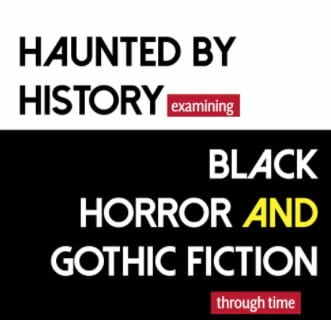
Debbie-Marie was awarded an Academic Year URG from the OUR in the fall and produced a podcast centering Black horror and fiction as it relates to different periods in American history. Debbie-Marie cites her inspiration from taking a literature class in AFAM last spring, “…we read some black speculative horror fiction that stuck with me! The Black protagonists I read about had this viscerally emotional racial experience that immediately catapulted me backward in time. 150 years or so ago, Charles Chesnut was writing gothic realist short stories that played with white society’s racist assumptions about the color line. I felt a spark of continuity between how Black horror and Black gothic fiction like Chesnutt’s each constructed the “monster” in their tales. Then I immediately understood that that Black literary tradition was passed down, and that ‘Black fear,’ as located in Black horror, is doing different things than your average white-centered scary movie. Jordan Peele was onto something.”
Coming from a journalism background, Debbie-Marie wanted to center college-aged people and Black and Brown academics. With this goal in mind, Debbie-Marie had their eyes set on developing this project into a podcast. She said, “I chose to use a podcast to host my research for a few reasons. First, I love audio, and I wanted my work to be accessible, but I also wanted the freedom of solo producing a short podcast series. I never had the opportunity to dedicate that much time toward an audio journalism project in undergrad. So my decision to apply to a URG for my final quarter allowed me to tune more deeply into my own love for Black literature, Black voices, and Black conversations.”
Andrew
Andrew
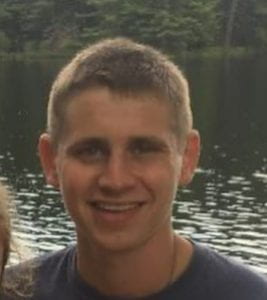
Andrew first got involved with his lab in January 2020 after spending his fall quarter meeting with different physics professors. Here’s what Andrew had to say about how his project transitioned once it became clear that conducting the work in-person was no longer a possibility.
“When the pandemic set in, my project (which at the time, involved building and modifying circuits) didn’t seem like something that could be moved to a remote setting, but I was able to find a way to utilize my resources so that I could continue my project. My lab supported me by offering a unique exception to their usual item ordering policy – instead of shipping the electronics I needed to the lab, my professor allowed me to order and ship those items directly to my home so that I could continue my project with just a small roadblock. I was lucky enough to be able to return to campus in the fall, so I have not yet had to plan an entirely remote research project. However, I think it is important to realize that a remote research project does not necessarily have to be entirely digital – not only was I able to get help from my lab to continue my work, but I also spoke with individuals at my father’s workplace who were able to loan me some additional testing equipment for the second half of my project. Of course, the rest of my lab members were available via Zoom meetings and emails to give me the advice and suggestions I needed to develop a coherent and thorough set of experimental results.”
Diamond
Diamond
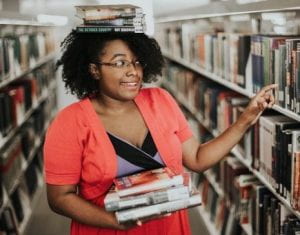
Diamond was able to turn her love for Japanese and video games into a research project of her own creation. Diamond said, “All I’ve done is like, I like these games, I like Japanese and that’s led me…to having fun with this…I would have to thank my advisors the most, who have helped guide me in my interests.”
Diamond described her journey as “complete coincidences and accidents, nothing was planned, which I love.” These “complete coincidences” have turned into a multi-year project for Diamond, where she has had the chance to analyze different archetypes that appear in indie games, how these games were received by Western audiences and why they were important to those communities. In wanting to intertwine her previous research while also being inspired by classes she was taking on girlhood and shojo, the period in between childhood and adulthood, Diamond’s present thesis topic is pushing back on thinking of girlhood as this ephemeral space where there is a lack of agency and autonomy, instead wanting to highlight it’s discomfort through the use of video games and their storylines of having young girl characters work through anxieties and navigate their discomfort. Through her research, Diamond has said going through this process has given her a different sense of self as well as being able to navigate creating balance in her research, school work, and other areas of her life. It gave her the tools of self-advocacy and having check-ins with herself along with managing resources and managing her time.
Kevin
Kevin
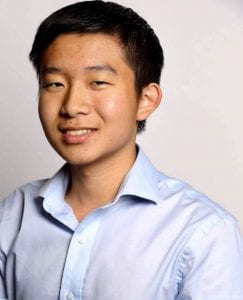
Kevin first got involved with his lab in January 2020. Here’s what Kevin had to say about how he got started with his lab and then what that work looked like once going in-person was no longer a possibility.
He said, “I got involved with the Choi Lab back in January 2020 and was going down to Feinberg regularly for a couple of months before leaving Evanston in March. When I joined, I was new and very much unfamiliar with many basic lab techniques, so I spent most of my time during that month or two learning procedures such as gel electrophoresis and PCR preparations. With the COVID-19 pandemic, I started a bioinformatics-heavy approach to my existing work, which allowed me to work from New Jersey over spring and summer 2020. Transitioning to a bioinformatics-heavy research approach was surprisingly smooth given the circumstances. It was essentially skipping the in-person lab portion and going straight to data analysis. I also had some coding and data analysis experience prior to joining the lab, and other lab members were working on similar projects and readily imparted their wisdom on me. My biggest challenge was that I was now working from a top-down rather than a bottom-up approach, so I spent a lot of time teaching myself the concepts behind the data while analyzing them at the same time. Half of my time was spent getting my pipelines to work, and the other half was spent bugging Dr. Choi or other lab members about conceptual questions or having them go over the concepts with me. Everyone at the Choi lab has been super helpful in transferring my work to a digital-heavy format, whether it was getting me set up with Northwestern’s computer cluster QUEST or bearing with me through all my many technical questions. I thank Dr. Jaehyuk Choi and Dr. Yuan Quan in particular for their mentorship and working with me during the transition at the beginning of and throughout the pandemic.”
Zach
Zach
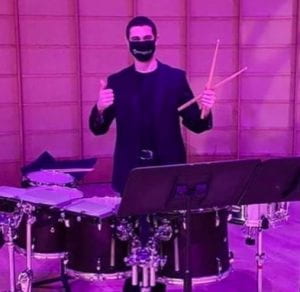
Zach spent his summer working on developing a method book for the snare drum. Zach said that his inspiration initially came from a class on percussion pedagogy and diving deep into studying nearly every method book for percussion. He said, “As a part of the course, I came up with concepts and tables of content for two books of my own and designed a curriculum for a beginner student. Learning about the pedagogical side of music got me interested in exploring it more deeply. I wanted to know the specifics about why certain exercises worked better or worse at targeting areas of weakness, and how connecting musical ideas to nonmusical ideas could be an effective pedagogical strategy. I hoped that by writing my own method book, I would discover answers to these questions and in the process, make myself a more effective teacher and a better player as well.”
To make his method book a reality, Zach’s primary percussion professor referred him to the OUR to find out about summer grant opportunities. Here, he found out about the SURG three days before the deadline! Zach worked with the OUR to learn the details about the grant and wrote a successful proposal! He said, “Grant writing was completely new to me, so I was very grateful for the help I got from my advisor. She went through my drafts and helped me make my writing much more accessible to the panel and explained the standard outline for a grant proposal in depth. I was lucky to have such a knowledgeable advisor, I couldn’t have done it without her!”
Rayna
Rayna
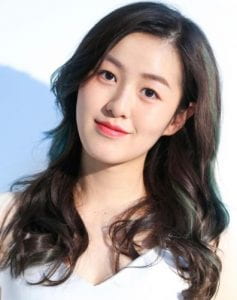
In all research, some aspects or assumptions around a project need to be reevaluated and re-shaped. Rayna said in her experience, “When I started doing the interviews, I assumed that online classes helped increase the gap between the haves and the have-nots. However, the story turned out to be more nuanced. Online classes gave some students access to teachers they did not have access to before, since some online classes were filmed for all students within the same province, regardless of the high school, and these teachers were the best in the country.”
When it came time to thinking about how she wanted this information to be received, Rayna knew, “…because I am a journalism student, I wanted my final product to be a published article rather than an academic report. I also knew at the time that I would probably be in China during the summer, and it would be easy to do the interviews. I started doing interviews in June and July, and I had already talked with more than 30 students and experts by the time I started writing. I organized the interviews and tried to find trends in them. I picked out several students that came from different financial backgrounds to illustrate the story.”
